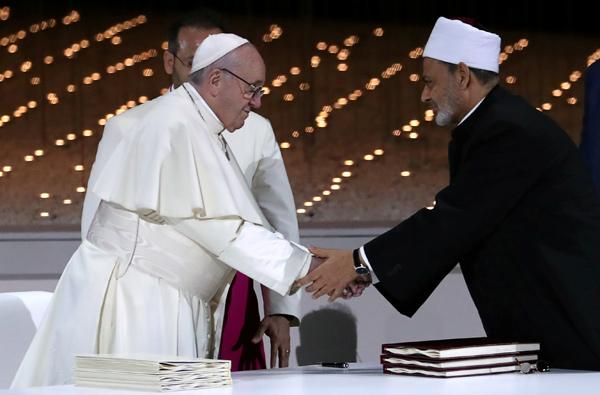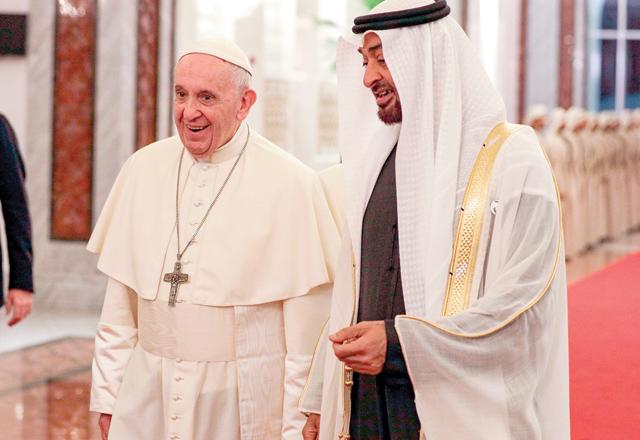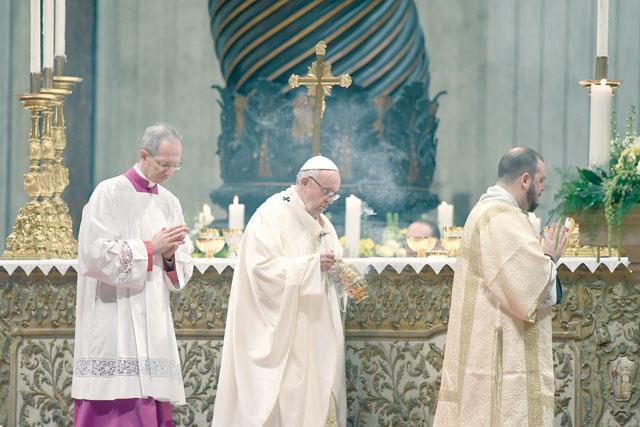You are here
Pope calls for end to wars in Middle East in Gulf trip
By AFP - Feb 05,2019 - Last updated at Feb 05,2019

Pope Francis shakes hands with Grand Imam of Al Azhar Sheikh Ahmed Al Tayeb after signing a document on fighting extremism, during an inter-religious meeting at the Founder's Memorial in Abu Dhabi, United Arab Emirates, on Monday (Reuters photo)
ABU DHABI — Pope Francis on Monday called for an end to wars in the Middle East during the first visit by the head of the Catholic church to the birthplace of Islam — the Arabian Peninsula.
Francis, who has made outreach to Muslim communities a cornerstone of his papacy, is on an historic three-day visit to the United Arab Emirates.
He is scheduled to hold an open-air mass on Tuesday for 135,000 of the Muslim country's million Catholic residents, set to be the largest ever public gathering in the Gulf state.
On Monday, the pope held talks in Abu Dhabi with Sheikh Ahmed Al Tayeb — imam of Cairo's Al Azhar, Sunni Islam's prestigious seat of learning — before delivering an address at an interfaith meeting.
In his address, the pontiff pushed the need for justice, equality of citizens' rights and an end to all wars, including in Yemen.
The United Arab Emirates and neighbouring Saudi Arabia are key allies of the Yemeni government, which is locked in a war against Iran-backed rebels that has pushed Yemen to the brink of famine.
The Pope said all religious leaders had a "duty to reject every nuance of approval from the word war".
"I am thinking in particular of Yemen, Syria, Iraq and Libya," he said at the interfaith meeting attended by Sheikh Ahmed and the UAE leaders.
Yemen is the scene of what the UN calls the world's worst humanitarian crisis, triggered by the intervention of Saudi Arabia, the UAE and their allies in a war between the government and Houthi rebels.
More than 10 million Yemenis now risk imminent starvation.
The UAE, which prides itself on its religious diversity in the Gulf, is also a member of the US-led coalition battling the Daesh group in both Syria and Iraq.
Sheikh Ahmed, who stressed in a speech that religion must never be used to justify violence, and the Pope signed on Monday a document that Al Azhar and the Vatican will work together to fight extremism.
Abu Dhabi Crown Prince Sheikh Mohammed Bin Zayed, one of the most powerful rulers in the seven emirates, on Monday gifted the Pope a deed for the plot of land on which the first church in the UAE was built.
Pope Francis in turn gave the crown prince a framed medallion of the meeting between St Francis Assisi — the pope’s namesake — and the Sultan of Egypt Malek Al Kamel, in 1219.
While the Pope did not openly discuss politics, he called for “the full recognition” of rights for people across the Middle East, a potential reference to communities including Shiites in Saudi Arabia, refugees and migrants, stateless peoples and other minorities.
The Pontiff called for “concrete opportunities for [interfaith] meeting, not only here but in the entire beloved region, a focal point of the Middle East”.
“I look forward to societies where people of different beliefs have the same right of citizenship and where only in the case of violence in any of its forms is that right removed,” he said.
The UAE has dubbed 2019 its “year of tolerance”, but rights groups have criticised the country for its role in Yemen, where an estimated 10,000 people have been killed since the Saudi-led alliance including the UAE joined the government’s fight against the Houthis in 2015.
Muslims make up nearly four fifths of the UAE’s population, but the country is also home to nearly a million Catholics, according to the Apostolic Vicariate of Southern Arabia.
Migrants from Asian countries make up about 65 per cent of the population.
The UAE has pushed itself as an open society in a conservative region. The country is home to churches, Hindu temples and a place of prayer that serves as a synagogue.
Bahrain and Qatar are home to one Catholic church each, while Oman, Kuwait and Yemen each have four and the UAE has eight Catholic churches.
Saudi Arabia bans all non-Muslim places of worship.
Related Articles
ABU DHABI — Pope Francis became the first pontiff to visit the Arabian Peninsula on Sunday, just hours after issuing his strongest condemnat
VATICAN CITY/ABU DHABI — Pope Francis is hoping to persuade a country enmeshed in a regional war that he has condemned to give Catholics mor
UR, Iraq — Grand Ayatollah Ali Sistani, one of Shiite Islam's top clerics, told Pope Francis in a historic meeting in Iraq on Saturday that














